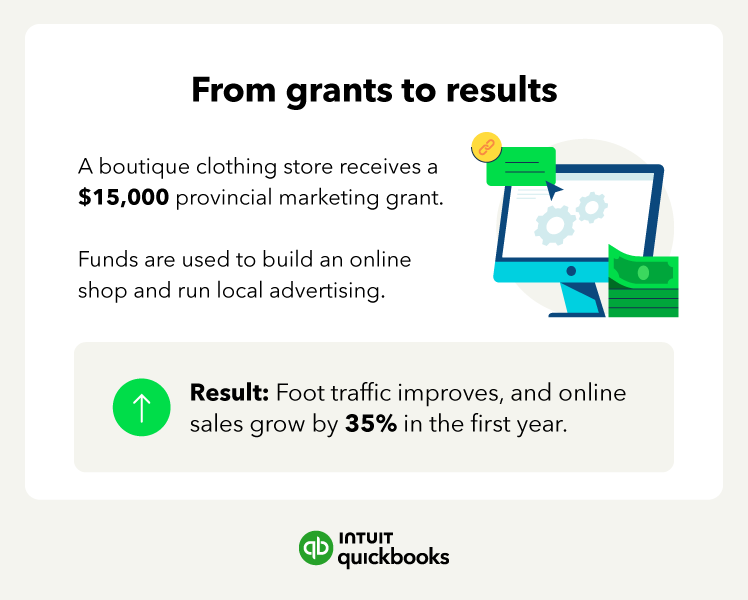Canada small business grant programs
A variety of small business grants are available through federal and provincial governments, regional agencies, and non-profit organizations. That said, finding the right program can feel like searching for a needle in a haystack.
It’s normal for owners to wonder what grants small businesses can apply for, since programs can vary widely by location, industry, or eligibility criteria.
A good first step is the federal database of grants, which lists funding opportunities across industries and provinces. From there, you can narrow your search to more targeted options.
Here are some additional resources to expand your search:
Provincial government programs
Each province offers its own set of small business grants to strengthen local businesses and support economic growth. Entrepreneurs can explore Ontario small business grant programs through portals like Ontario Business Grants or Ontario Creates. Provinces like British Columbia maintain a searchable database of provincial programs to help business owners access support.
Quebec small business grants focus on supporting innovation and job creation, and localized New Brunswick funding programs range from arts and music industry development to business investment tax credits and digital transformation grants.
Regional development programs
Canada’s regional development agencies provide targeted support for businesses in specific areas. For example, ACOA's Business Development Program (BDP) helps SMEs and cooperatives start up, expand, or modernize. Funding may include interest-free repayable assistance for businesses or non-repayable support for non-profit organizations.
Programs for Indigenous and First Nations
Indigenous entrepreneurs can access dedicated funding streams through federal programs like the Indigenous Growth Fund and regional initiatives designed to support First Nations-owned businesses.
Programs for Black entrepreneurs
The federal government partners with Black-led organizations to increase access to funding for Black-owned businesses. One of the largest initiatives is the Black Entrepreneurship Program (BEP), which provides grants, loans, and business support to help entrepreneurs grow and scale.
Programs for students and young entrepreneurs
Grants are also available for students and young business owners. For example, Futurpreneur Canada offers financing and mentorship for entrepreneurs aged 18-39. These often partner with federal funding programs that reduce barriers for new business owners.
Beyond Futurpreneur, entrepreneurs under 40 can also benefit from financing options tailored to their growth stage, such as startup financing for Canadian entrepreneurs under 40.
Programs for women
Women entrepreneurs can access special government grant and loan programs designed specifically to support women entrepreneurs. At the federal level, the Women Entrepreneurship Strategy provides loans, mentorship, and ecosystem funding to help women-led businesses grow.
Provinces also back initiatives such as WeBC in British Columbia and Alberta Women Entrepreneurs, which offer financing to businesses with majority women ownership.







